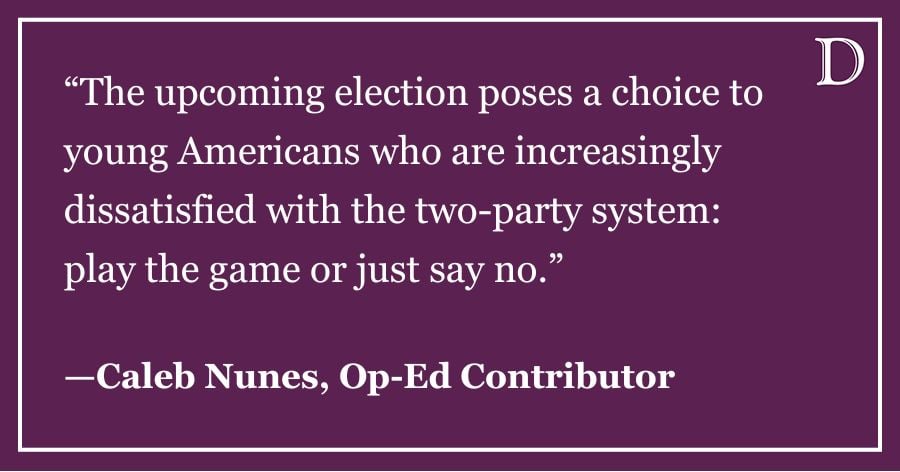“This savagery,” was what I thought when first hearing of the barbaric attack on Israel by Hamas terrorists on Oct. 7. The historical significance of the date, 50 years after the 1973 attack beginning the October War, combined with the sheer indifference to human life, left me appalled and ready to defend Israel at any cost.
These actions have prompted response from the media and college campuses across the U.S., and I’m sure the recent announcements from President Michael Schill have caught the attention of many on campus. Initially consumed with rage as I scrolled through my X, formerly known as Twitter, feed, I thought, where is President Schill? In the past, the university has made it clear that it can craft public announcements for different events that prompt commentary ― considering its posts on George Floyd and the overturning of affirmative action and the university’s commitment to diversity.
But now I have to reconcile my outrage of the actions committed by Hamas with what is happening to innocent Palestinians in Gaza, and the picture is getting quite muddy.
Israel has every right to defend itself after this attack — but invoking self defense doesn’t provide a mandate to make the Gaza Strip, a territory with over 2 million people, completely uninhabitable or launch 6,000 bombs on 141 square miles in five days.
This type of retaliation, considered with the ground invasion of the Gaza Strip, prompts the following questions: Do the lives of many nonviolent Palestinians need to be considered in how Israel weighs response options? And could the intensity of Israel’s reaction have effects counterproductive to Israel’s supposed aims?
Many leaders appear to take the stance that the loss of Palestinian lives are not a pressing concern. Consider Sen. Lindsey Graham’s (R-S.C.), receptiveness to the idea of Israel leveling the Gaza Strip. The fact President Biden has changed the administration’s stance on a humanitarian pause is proof the questions I have asked are important to the people.
The same indifference to human life exhibited in Hamas attacks on a techno music festival, or paraglider attacks is increasingly being expressed in the retaliation by Israel and rhetoric coming from our political leaders.
What America and the Middle East need is not warmongering rhetoric or escalation, but prudence and the reminder that war and the actions carried out in its name are ontologically constructed upon the premise that innocent human life can be taken as a means to an end — the end being the proverbial peace. This assertion may seem radical, but I think even Sen. Graham may concede this point.
For example, during the bombing of Hiroshima and Nagasaki and the bombings of cities in the United Kingdom and Germany during World War II, it was just accepted that non-violent individuals would be lost as a consequence of these actions. If one examines most foreign conflicts, with notable exceptions like the Cold War, all aggressive and sometimes defensive actions of war are based on this premise of civilian casualties.
Given this reality, Israel and the U.S. must exercise prudence amidst savagery, or they might risk turning into the barbarians they so repeatedly condemn. Prudence does not constrain Israel in its ability to defend itself from these attackers. But exercising this long ignored virtue requires Israel to weigh the consequences of its blockade and its invasion of the Gaza Strip.
Furthermore, if casualty figures remain high, and more and more stories come out about the ruins in which human beings are living, it is not unlikely that other Middle Eastern countries will withdraw — to a degree — from their relations with Israel. While it was evidenced by Egypt’s rejection of Palestinian refugees that some Arab nations are not willing to extend real compassion to these huddled masses, that does not change the reality that latent antisemitism in the region can be irritated by the degree of severity of retaliation by Israel.
I look back at my initial response to the events of Oct. 7 with regret. While I was right in my disgust of the actions displayed by Hamas terrorists, I was naive about the responses that would come after. The dehumanization of innocent, non-violent individuals that comes with war is an incredibly high cost to pay. This cost must be weighed with the perceived benefits of continuing the blockade and bombings on Gaza and moving forward with a ground invasion.
If one thing has been true about the Israeli-Palestinian conflict, it is that war begets war, and peace — the ostensible aim of war — ends up being forgotten in the whirlwind of the human emotions that surround these acts of terror.
Caleb Nunes is a McCormick sophomore. He can be contacted at [email protected]. If you would like to respond publicly to this op-ed, send a Letter to the Editor to [email protected]. The views expressed in this piece do not necessarily reflect the views of all staff members of The Daily Northwestern.


















